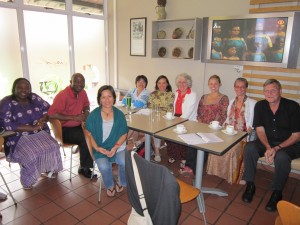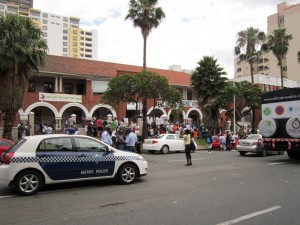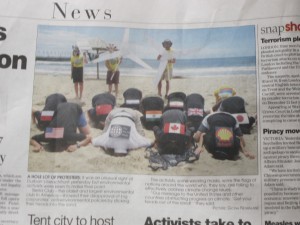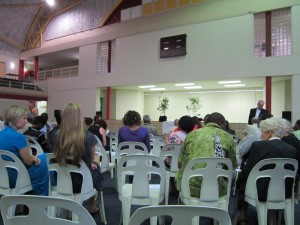COP17 — From Meeting to Marching to Prayer
On Sunday, December 4th, several KAIROS partners and collaborators gathered to debrief and discuss their experiences of Durban COP17 (so far!) over lunch at the Diakonia Centre, home to the Faith Secretariat for this COP.
Beyond Julia, Caroline, Ivonne, and Georgine, all of whom I’ve described in earlier blogs, there were Tolbert Jallah (General Secretary of the Fellowship of Christian Councils and Churches in West Africa, FECCIWA, and a coordinating member of the Pan African Climate Justice Alliance – PACJA – who visited the KAIROS Ecumenical Circle of Collaboration on Global Partnerships meeting in late September ), Vernie Yocogan-Diano (chair of Innabuyog, an alliance of indigenous women’s organizations in the Cordillera region of northern Philippines, and who was recently in Canada on KAIROS’ Living Courage Tour), Tetet Lauron (IBON Foundation in the Philippines, and part of the official Philippine negotiating team on financing, who was a co-panelist with Georgine for a climate financing side event, and was also recently in Canada for a Canadian Council of International Cooperation climate justice conference), Joy Kennedy (member of KAIROS’ Ecumenical Circle of Collaboration on Sustainability) and Kaitlin Bardswich (part of the same WCC-LWF youth program as Caroline) of the United Church of Canada. We asked ourselves the following seven questions: What have you been doing at CO17 so far? What have you learned? What key messages will you take back with you? What has surprised you the most? What has disappointed you the most? What has inspired you the most? What will you being doing this next week?
Ivonne arrived a week before the COP (as did Ken), and along with groundwork South Africa and other Friends of the Earth International affiliates, deepened commitment to the “leave the oil in the soil” campaign. In the last week she participated in REDD+, energy, and Rio+20 side events at the People’s Space at the University of KwaZulu-Natal (UKZN). Georgine has participated in the Faith Secretariat’s orientation, rally, Global Day of Action march, and People’s Space side events on spirituality of the earth, and going beyond COP17 mitigation limits for the earth side events. She has also interacted with young people from Angola and Mozambique in the hotel where she has been staying and reading up on climate change and finance in advance of her side event presentation. Julia, who came late to the COP, had a surprise meeting with Georgine at the exhibition site next to the International Conference Centre (ICC). She also attended a press conference and orientation of small islands states (SIDS) and a side event on climate and communications. Meanwhile, Tolbert was helping host some 300 participants in a PACJA caravan that had just arrived, and joined with Patrick Bond in a side event where participant were exhorted as a last resort to get in the streets. He also participated in a side event put on by the Action of Churches Together (ACT) Alliance on food security and examined conservation versus conventional agriculture. Tetet participated in a side event in the ICC on food sovereignty and climate finance, and has been part of the Climate Justice Now! (CJN!) activities. Vernie participated in a side event on Asia-Pacific Forum on Women and Development that dealt with gender and climate change, an IBON event on development effectiveness, and another on agriculture and climate change. Caroline and Kaitlin have been engaged in the WCC-LWF youth program, where Joy has also spent time with youth.
In short, very full agendas!
In terms of what has been learned since being at COP17, Tetet said that, in effect, the more things change the more they stay the same on the inside of COP. With the World Bank’s involvement, now civil society organizations may even include corporations. Outside the COP, there is limited space for civil society action to be recognized by negotiators, which is a product, in many respects, of civil society’s resistance to the corporatist commodification of natural resources. For Georgine, it is clear that some people have real control of the agenda and direction of the COP and wonders what will happen in the coming week. She wonders if CSOs, especially the churches, are ready to fight for the right cause.
Tetet has low expectations of this COP. Despite Durban’s “law of 14” whereby no group of 14 persons or more may congregate without official sanction, she is inspired that people can still protest. She is disappointed that countries continue to protect their own interests. Georgine is disappointed that leaders are holding on to their own positions too strongly – they must be ready from a different book as it relates to climate justice.
What has most inspired Tetet is that people are protesting in the streets. There are good people springing up throughout the COP process. Georgine has been inspired by the young people in the youth caravan and their creativity. While Georgine is leaving COP17 shortly, Tetet be presenting a side event at the Diakonia Centre on ethical financing this coming week.
Tolbert said that people from the cities, towns and villages through which the youth caravan passed on its way to Durban wanted to come as well, but they know as much as they should about the processes and issues through fault of their national governments.
Ivonne pointed out that unity among civil society does not always guarantee the goals of better outcomes from the COPs. In Cancun, for example, Via Campesina – the international peasant movement – wasn’t seeking unity with the rest of civil society. Synergy is more important than unity. There have been struggles and differences with the C17, the local civil society organizing committee for COP17, over various civil society approaches. We must all be thinking about Rio+20. Joy mentioned the interfaith struggles here in Durban in the lead up to COP17 where diversity has been maintain toward a common vision. Ivonne said the issue of unity versus synergy (and perhaps lowered expectations of COPs since Copenhagan resulted in the smallest march this last Saturday in at least three years (Patrick Bond called it “biggish” – you can do the hermeneutics!). Caroline thought that non-religious youth were more mobilized for the march than church youth. For Julia, it was her first time at a COP and she was surprised the civil society delegates don’t have more space. She hopes to come more prepared for future COPs.
Joy spoke of the value of reciprocity, referring to the South African church leaders’ ad in the Globe and Mail last week (which asked Canadians, who so valiantly took a stand against Apartheid in the 1980, to show leadership on lowering carbon emissions) and the National Post’s inflammatory response. The values of the global South cannot so easily be dismissed. Tolbert spoke of African governments needing more resources for climate adaptation and referred to a march last week to protest Canada’s position. Climate change is killing Africans. Joy said African governments need to continue to be empowered to stick to their KP track.
In terms of messaging, Ivonne said we must all learn better to sing and deepen our capacity to celebrate – as was evidenced in last Saturday’s Global Day of Action march. She and Julia recalled how powerful and inspiring it was to hear a thousand rural women singing at once during a side event. Her commitment to “leaving the oil in the soil” is deepening. The false vision or solution of a “green economy” (without substantial emission reductions) needs to be unpacked. Joy noted that this will be important for Rio+20. Jubilee South has critiqued this concept, as has Via Campesina. This may forebode a separate track at Rio+20 than that which may be followed by high emitting major government, ENGOs, BINGOs and most corporations.
This coming week there will be a “Fossilizing Fossil Fuels” side event. There have already been “King Coal” New Orleans style funerals at this COP. Nnimmo Bassey launches Dystopia on Monday, December 5th.
Vernie says COPs are not the answer as they are conferences of the polluters and climate criminals. The activities outside the COP are more sensible. No amount of reparations should silence protest. Tolbert referred to Archbishop Tutu’s statement in the stadium last week that we’re all in the same boat (i.e., there is not planet B), some (i.e., the poor) will just get there (i.e., the afterlife) earlier than others (i.e., the relatively more rich) due to the effects of climate change.
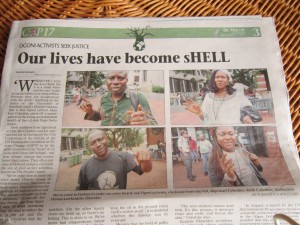
Ken from Oilwatch Africa appears in the lower left photo on the pages of The Mercury, the largest morning circulation newspaper in Durban, pleading the cause of the Ogoni in the Niger Delta dealing with oil devastation left by Shell
